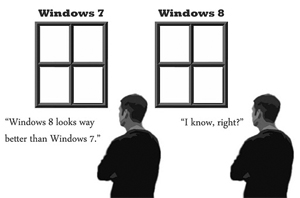With the steadily rising mobile computer market and popular online services, programs are planning to change their user interfaces. Despite its looks and interactivity on multiple platforms, its not the time to rely on them.
Facebook recently put out the latest version of their interface.
It has not made any significant changes but expands the “Friends” list system to feature user specific updates and have all posts situated to a central page instead of having their own unique page.
Those modifications hint at what can be implemented on tablet computers.
Currently available for platform developers is an upcoming future overhaul for Facebook. It simulates an app-style navigation system with each section appearing as if it was displayed on a tablet.
While the upcoming changes are currently set for only regular computer platforms, it hints that tablet computers have reached some prominence. The influence best is represented in the upcoming Windows 8 operating system.
The new style of Windows 8 completely removes the desktop style people are familiar with and uses a new navigation system similar to Microsoft’s Metro design found in Zune and Windows Phone products.
A reason behind this change was to have all the platforms—including touchscreen tables—running exactly the same.
Both Windows 8 as well as the current and future changes of Facebook are one of the many things receiving a major change influenced by the mobile explosion.
They can be considered divisive among the tech community when compared to their older and more familiar iterations, especially for Windows.
Companies cannot abruptly make a majority of their users migrate to an entirely new system or else they will feel uncomfortable. There has to be particular aspects of older versions into the new iteration to help get users latched on.
For names such as Windows and Facebook, people will likely picture the look of what the services represent.
A different change without any build up from an older iteration can be intimidating to
some.
While companies want to capitalize on an industry spearheaded by Apple’s iPhone and
iPad, the technology is still relatively new in the industry and not a necessity for a crowd who still primarily use desktops or laptops with older Windows operating systems.
Even with Steve Jobs’ claim that computer technology is now part of the “post-PC era,” desktops and laptops are still important today.
When the majority of people fully transition to newer platforms like tablets, it will be some time before significant marketing progress begins.
For now, people shouldn’t have to deal with abruptly new interfaces in order to welcome the growing mobile computer department.
People are not ready and if they are pressured to adapt to them, it can create a negative impact for users in the long run.

